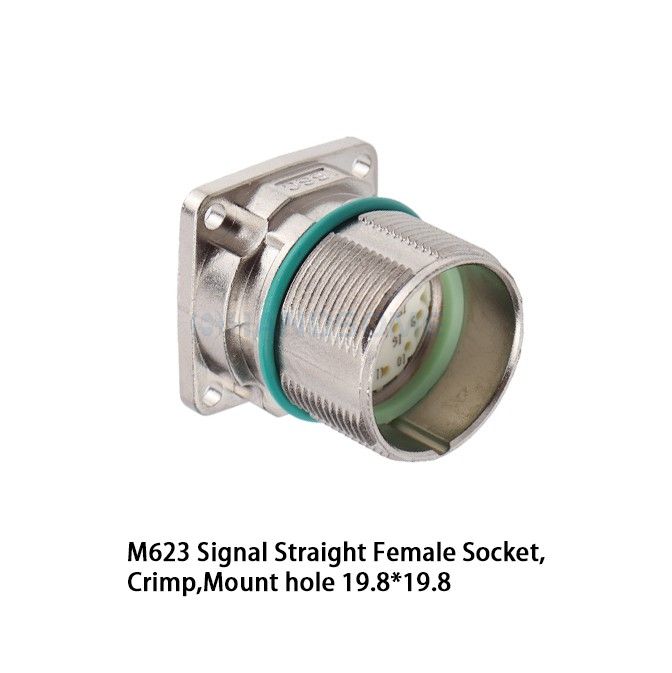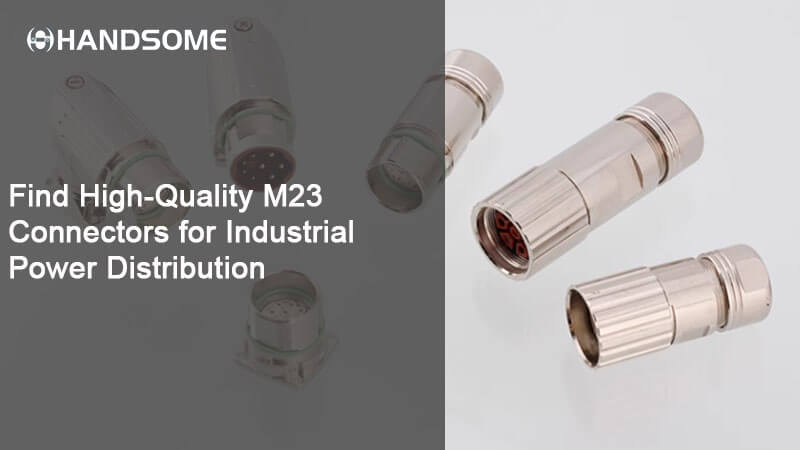Table of Contents
When it comes to industrial power distribution, one of the most critical choices you’ll make is selecting the right connectors.
As an engineer-purchaser specializing in electronic and industrial automation, I’ve seen how the wrong choice can lead to equipment failures, costly downtime, and frustrated teams.
That’s why I always advocate for high-quality M23 connectors.
Designed specifically for industrial applications, these connectors deliver the durability, reliability, and performance you need to keep your systems running smoothly.
In this article, we’ll explore why M23 connectors are essential for industrial power distribution, their key features, and how to choose the best ones for your needs.

m23 Power Connector M623 Signal Straight Female Socket
Why M23 Connectors Matter in Industrial Power Distribution
What Are M23 Connectors?
M23 connectors are circular connectors commonly used in industrial applications to transmit power, data, or a combination of both.
Their compact design, high power capacity, and robust construction make them a favorite in industries ranging from manufacturing to renewable energy.
I still remember my first project involving M23 connectors—a robotics system for a factory’s production line.
Initially, we went with a cheaper, less robust connector. Big mistake. Within six months, we were replacing dozens of connectors due to overheating and wear.
Switching to M23 connectors not only solved the problem but also improved the overall efficiency of the system.
Key Features of High-Quality M23 Connectors
1. Rugged Construction for Industrial Environments
Industrial environments are harsh, with exposure to dust, moisture, and vibrations. High-quality M23 connectors are built with durable metal housings that withstand these conditions without degrading.
For instance, in a mining equipment setup I worked on, the machinery faced constant vibration and rough handling. Standard connectors failed repeatedly, but M23 connectors with reinforced locking mechanisms handled the abuse without issues.
2. High Voltage and Current Ratings
Industrial equipment often requires connectors capable of handling high power loads. M23 connectors are designed to support voltages of up to 630V and currents of up to 28A, making them suitable for powering motors, conveyor belts, and other heavy-duty equipment.
3. Ingress Protection (IP Ratings)
A critical feature of M23 connectors is their ingress protection (IP) ratings, which can go as high as IP67 or IP69. These ratings ensure connectors are dust-tight and can handle immersion in water, making them ideal for outdoor or washdown environments.
I’ve used IP69-rated M23 connectors in food processing plants where equipment needed regular high-pressure cleaning. They performed flawlessly, even in such demanding conditions.
4. Temperature Resistance
Industrial systems often operate in extreme temperature ranges. M23 connectors typically function between -40°C and +125°C, ensuring consistent performance even in the harshest environments.
5. EMI Shielding
Electromagnetic interference (EMI) is a common issue in industrial settings, especially around high-power equipment. M23 connectors with integrated EMI shielding prevent signal distortion, ensuring clean power distribution and reliable communication.
Applications of M23 Connectors in Industrial Power Systems
1. Powering Industrial Machinery
M23 connectors are widely used in machinery like CNC machines, conveyor systems, and automated production lines. Their robust design ensures consistent power delivery, minimizing downtime.
2. Robotics and Automation
From robotic arms on assembly lines to autonomous guided vehicles (AGVs), M23 connectors handle both power and data transmission seamlessly. I’ve seen them used effectively in factory robots that needed reliable connections for continuous operation.
3. Renewable Energy Systems
In solar and wind power systems, M23 connectors link critical components like inverters and control units. Their durability ensures reliability in outdoor environments.
4. Heavy-Duty Equipment
Industries like mining and construction rely on M23 connectors for their ruggedness and ability to handle high currents, ensuring reliable operation in tough conditions.
How to Choose the Right M23 Connector
1. Assess Power Requirements
Before selecting a connector, determine the voltage and current levels required by your equipment. High-power applications need connectors with sufficient ratings to handle the load safely.
2. Consider Environmental Factors
Will the connector be exposed to dust, water, or extreme temperatures? Choose a connector with the appropriate IP rating and temperature tolerance to match these conditions.
3. Check for Durability
Look for connectors made from corrosion-resistant materials, like nickel-plated brass or stainless steel, and ensure they have a secure locking mechanism to prevent accidental disconnections.
4. Evaluate Ease of Installation
Some M23 connectors feature quick-locking systems that make installation faster and easier, saving valuable time during setup and maintenance.
Common Mistakes to Avoid When Sourcing M23 Connectors
1. Ignoring Technical Specifications
A mismatch between the connector’s ratings and your equipment’s requirements can lead to overheating, failure, or even safety hazards. Always verify the specifications before purchasing.
2. Prioritizing Cost Over Quality
While it’s tempting to go for cheaper connectors, they often lack the durability and reliability of high-quality M23 connectors. The initial savings can quickly evaporate with increased maintenance and replacement costs.
3. Overlooking Supplier Reputation
Not all suppliers are equal. Partnering with a trusted supplier ensures consistent product quality and access to technical support when needed.
Tips for Finding Reliable Suppliers
1. Look for Certifications
Suppliers with ISO certifications and adherence to industry standards are more likely to provide reliable products.
2. Check Product Range
A supplier offering a wide variety of M23 connectors is better equipped to meet your specific needs, whether it’s for power, data, or hybrid applications.
3. Read Customer Reviews
Online reviews and case studies can provide insights into a supplier’s reliability, customer service, and product performance.
4. Evaluate After-Sales Support
Reliable suppliers offer warranties and technical assistance, ensuring you’re covered in case of any issues.
Future Trends in M23 Connectors
1. Hybrid Connectors
Hybrid M23 connectors, capable of transmitting both power and data, are becoming increasingly popular in industrial automation.
2. Smart Connectors
Integrating IoT capabilities into connectors allows for predictive maintenance and real-time performance monitoring, reducing downtime.
3. Sustainability
With a growing emphasis on green manufacturing, eco-friendly materials are making their way into connector designs.
Real-World Success Stories
In one instance, a manufacturing plant switched to high-quality M23 connectors for its production line. The result? A 30% reduction in downtime and a noticeable improvement in energy efficiency.
Another example comes from a solar farm installation. Using IP69-rated M23 connectors ensured reliable performance, even during monsoon season.
Conclusion
M23 connectors are the backbone of reliable industrial power distribution. Their rugged construction, high power capacity, and resistance to harsh conditions make them an indispensable choice for engineers and purchasers alike.
If you’re looking to enhance the reliability and efficiency of your industrial systems, investing in high-quality M23 connectors is a smart decision.
By choosing the right connectors and working with trusted suppliers, you’ll not only protect your equipment but also achieve long-term cost savings and improved system performance.
